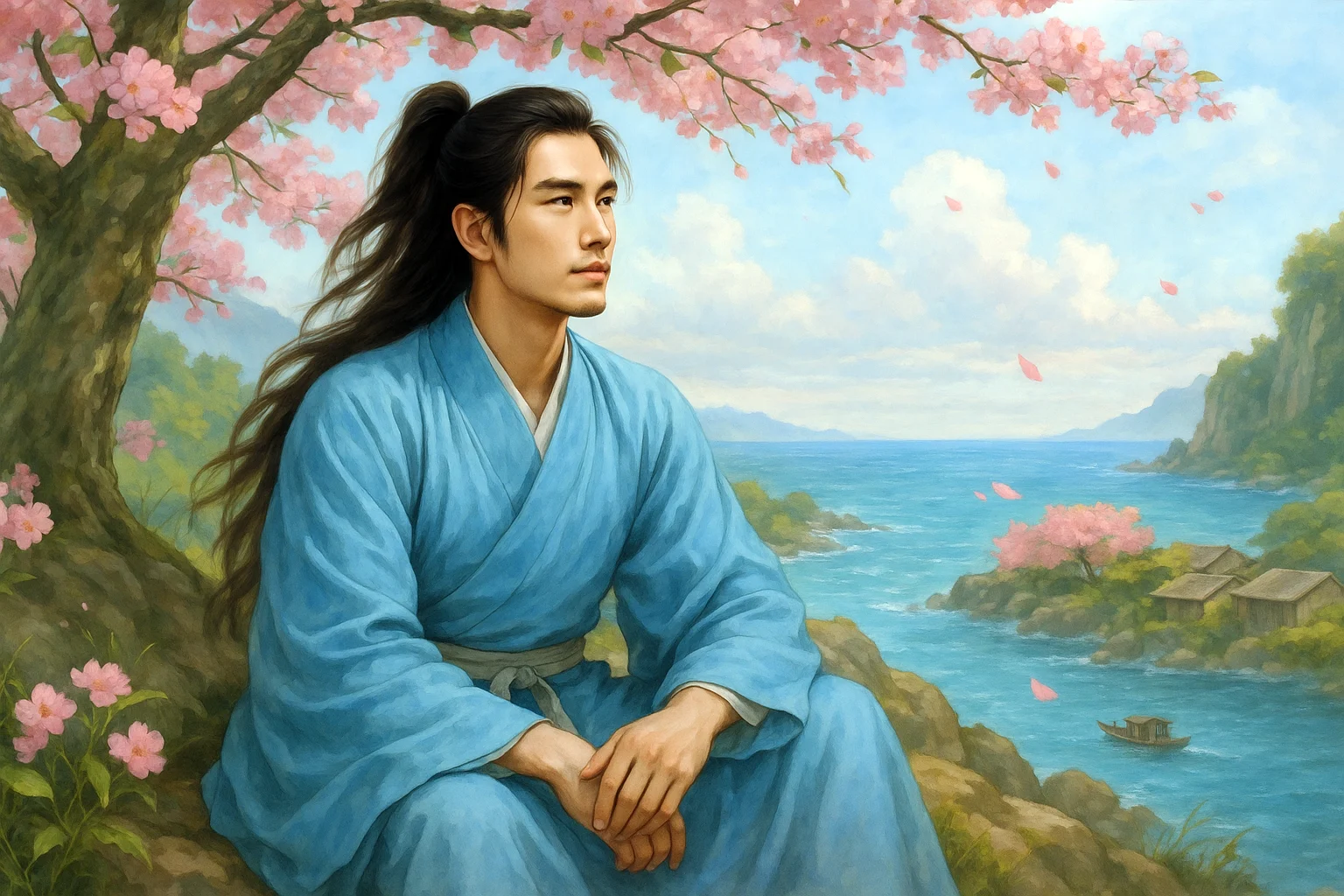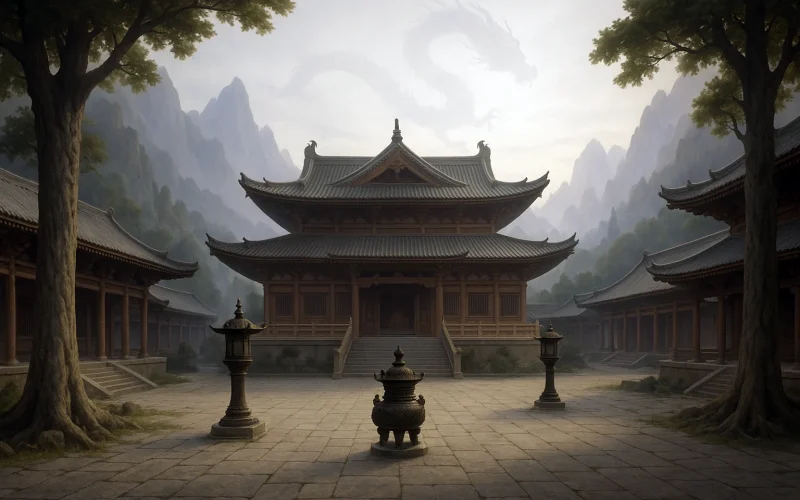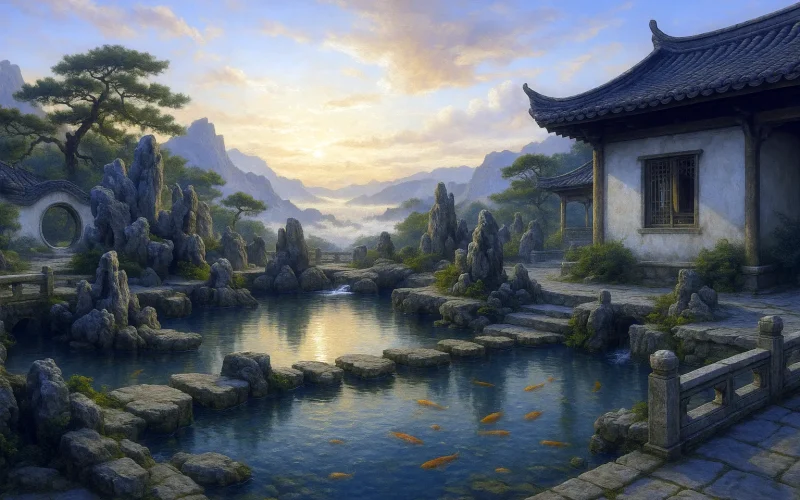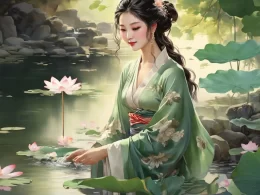Long has the sage led souls to liberation’s shore,
Where empty cliffs drown in flowers’ misted lore.
Men see but his meditation’s grace,
Not the heart that acts with no trace.
His hermitage door faces the ravine’s sigh,
Farmers’ paths hide where woods run high.
He speaks of Dharma’s true nature—
His return outshines gold’s lure.
Original Poem
「题招隐寺绚公房」
綦毋潜
开士度人久,空岩花雾深。
徒知燕坐处,不见有为心。
兰若门对壑,田家路隔林。
还言证法性,归去比黄金。
Interpretation
This poem, composed during Qiwu Qian’s visit to Zhaoyin Temple in the Tang Dynasty, reflects the deep cultural interplay between literati and Buddhism in medieval China. The "Abode of Xuan" refers to the dwelling of a revered monk named Xuan Gong, embodying the Tang elite’s fascination with monastic life. Through delicate depictions of mountain solitude and meditative stillness, Qiwu contemplates the essence of spiritual practice—where nature’s tranquility mirrors the Dharma’s ineffable truth.
First Couplet: "开士度人久,空岩花雾深。"
Kāi shì dù rén jiǔ, kōng yán huā wù shēn.
Long has this noble sage delivered beings—
now empty cliffs drown in flower-scented mist.
The opening honors Venerable Xuan’s spiritual stature. "Noble sage" (开士), a term for accomplished monks, nods to his decades of compassionate work ("delivered beings" 度人久). The "flower-scented mist" (花雾深) shrouding the cliffs symbolizes both the obscurity of profound practice and its fragrant, permeating influence—an olfactory metaphor for Dharma’s subtle omnipresence.
Second Couplet: "徒知燕坐处,不见有为心。"
Tú zhī yàn zuò chù, bù jiàn yǒu wéi xīn.
We see only his seat of serene repose,
no trace of a mind that constructs or strives.
Here, Qiwu confronts the paradox of enlightened activity. The monk’s "serene repose" (燕坐处) exemplifies wuwei (无为)—effortless action—while "no trace of a striving mind" (不见有为心) reveals the Mahāyāna ideal of anabhoga-caryā (non-contrived conduct). The couplet’s brilliance lies in its negative theology: the sage’s essence is known precisely through absence.
Third Couplet: "兰若门对壑,田家路隔林。"
Lán rě mén duì hè, tián jiā lù gé lín.
The hermitage gate opens onto ravines,
far from farmhouse paths beyond the woods.
Sacred and secular spaces diverge sharply. "Hermitage" (兰若), derived from the Sanskrit araṇya (wilderness), emphasizes the temple’s intentional isolation. The "ravines" (壑) represent the abyss of śūnyatā, while "farmhouse paths" (田家路) signify worldly entanglements. The physical barrier of woods (隔林) becomes a metaphor for the mind’s detachment.
Fourth Couplet: "还言证法性,归去比黄金。"
Hái yán zhèng fǎ xìng, guī qù bǐ huáng jīn.
They say he’s realized Dharma-nature—
this homecoming outshines gold.
The finale crystallizes the poem’s spiritual economy. "Dharma-nature" (法性), the ultimate truth of all phenomena, is here rendered not as abstraction but as lived experience ("realized" 证). The alchemical metaphor—"homecoming outshines gold" (比黄金)—transmutes monastic renunciation into supreme value, echoing the Vimalakīrti Sūtra’s teaching that true wealth lies beyond materiality.
Holistic Appreciation
This work blends scene-painting with emotion, merging realism and lyricism seamlessly. The first two couplets focus on the monk Xuangong, depicting his years of practice and state of being to express admiration and awe. The latter couplets shift to the temple environment and the meaning of spiritual cultivation, deepening the poetic resonance.
The poem captures both the quiet beauty of mountain forests and the profundity of Buddhist wisdom. Observing practitioners from a worldly outsider’s perspective, the poet expresses not only admiration and envy but also profound contemplation. Rather than mimicking Buddhist discourse, Qi Wuqian writes with an independent aesthetic gaze, making the poem transcendent without being abstruse, elegant without being austere—showcasing his noble spirit and lucid inner world.
Artistic Merits
This poem employs understated language and ethereal imagery, revealing the poet's inner tranquility and reverence throughout. Qi Wuqian skillfully uses parallelism and symbolic imagery to construct a poetic space—phrases like "flowers and mist in empty cliffs," "gate facing the ravine," and "path separated by woods" depict the temple's serene beauty while evoking the transcendent life of monastic practitioners.
Words such as "only knowing," "not seeing," and "still saying" lend subtle depth to emotional expression. Without explicitly stating the sublimity of spiritual practice, the poem conveys reverence implicitly. Though the word "Zen" never appears, the entire poem is suffused with Zen-like tranquility—a classic example of "Zen within poetry, meaning beyond words."
Insights
More than just a serene depiction of monastic life, this poem is a meditation on spiritual practice and human existence. Through his portrayal of the practitioner’s way of life, the poet invites reflection on "retreat" versus "engagement." In a noisy, troubled world, one life-choice is stillness, "non-action," and "returning."
With deep affection and respect, Qi Wuqian celebrates this state of being, reminding us that spiritual richness far outweighs material gold. The poem reflects Tang literati’s understanding of Buddhist practice while embodying the poet’s values—transcendence, purity, and clarity.
About the Poet

Qiwu Qian (綦毋潜 692–c. 755), a native of Ganzhou (modern-day Ganzhou, Jiangxi), was a representative poet of the Landscape and Pastoral School during the High Tang period. He earned the jinshi degree in 726 (the 14th year of the Kaiyuan era) and held official positions such as Right Reminder (You Shiyi) and Editorial Director (Zhuzuo Lang) before retiring to the Jiangnan region. His poetry, renowned for its depictions of reclusive life and natural landscapes, is characterized by a serene and understated style. He exchanged poetic works with Wang Wei, Meng Haoran, and other literary figures. The Complete Tang Poems (Quan Tangshi) preserves 26 of his poems, which stand out distinctly within the High Tang landscape poetry tradition and significantly influenced the development of later Zen-inspired poetry.












